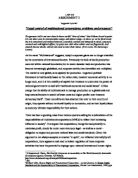Issues:
According to a Background Paper for the UN Financing for Development Process (2000), governments are gradually becoming less capable to control multinational corporations. Korten (2001:147-150) defined the current situation as ‘democracy for hire’ i.e. the policy agendas of states and international institutions are formed according to the principle ‘one dollar = one vote’. Indeed, in the U.S. in order to reach and influence those who make legislative decisions, each of the 12 largest corporations appears to be sponsors at both Democratic and Republican conventions. For example, AT&T paid $670,147 and $1,090,487 to the named parties respectively in 1995, and the same year the White House abandoned B. Sanders’ effort to eliminate the Overseas Private Investment Corporation, which insures overseas investments by U.S. MNCs, which surprisingly matched AT&T’s interests (Salant, 1996). Thus corporations have high degree of power over governments.
Secondly, the cooperation between them becomes vivid in the international arms manufacturing sector. Despite Cold War is finished, Pentagon still spends its $260-billion budget on weaponry and sells the latter all around the globe in order to sustain the US economy, while the arms manufacturers get their profits (Morgan, 2000). Furthermore, they get more structural power on the arms market through the documents, such as the U.S. Excess Defense Articles Program (Bertsch G. K. & Jones), which literally authorizes the US President to sell ‘excess defense articles on grant basis’ to any developing country, that later use them in wars on our planet. This means that corporations receive influence over security of our planet.
Thirdly, MNCs decide on production. When Enron, the Houston-based multinational engineering giant, has decided to raise its profits by means of building $2.8 billion gas-fired power plant a hundred miles south of Bombay in India, it was obvious for the local people and government that the project was extremely expensive, inefficiently located and ecologically threatening; people did not wish to get electricity for this cost. However, in 1996 the Indian government officially approved Enron's request to build the plant (Mayur, 1996). This means that neither local demand, no government or common sense, but MNCs determine ‘what, when, how and by whom shall be produced’ (Strange, 1988:29)
Furthermore, despite K. Ohmae in his world-famous book ‘The Bordless World’ was aimed to show that the MNCs ‘are truly the servants of demanding consumers’ (1994:10), the real world shows that corporations determine our demand. For example, consumers literally have to buy hard- and softwares produced by IBM and Microsoft in order to be able to operate and communicate successfully (Klein, 2000:165-178). Often corporations shape our demand through control over our knowledge by means of media. The top 100 of the largest US MNCs ‘pay for 75% of commercial televisions time an 50% of public television time’, and thus the knowledge that ‘Coke is best’ (Korten, 2001:153-155) is transformed into presence of this drink on almost any party in the world.
Response:
In the given report we are going to look how three social units i.e. international organizations, local communities and individuals, attempt to create opposition to the corporate power.
The general basic aim of international organizations such as NAFTA, WTO, APEC, MAI, the EU, etc. is expected to be concerned with establishment of legitimacy and stability of the trade negotiations around the globe (Strange, 1988:181-182). However this statement seems to be biased, because even the core documents of WTO and NAFTA encompass corporate interests (Green, 2004). For example, NAFTA’s Chapter 11 permitted corporations expansive privileges including possibility to "sue" governments for any actual or proposed loss in profits related to the newly introduced laws (NAFTA, 1993). Under this chapter, the Ethyl Corporation, American gasoline additive company, successfully sued the Canadian federal government when it banned MMT in gasoline for $251 million (Green, 2004). Thus the reaction expected from international organizations becomes suppressed from inside.
The local communities’ opposition to the corporate power and personal life-style choices also appear to be ineffective. The remonstrances take form of boycotts in front of McDonalds and Nike in such annual events as ‘Buy Nothing Day’ on the 24th of November. This day about 60% of the U.S. population is buying nothing, which is expected to be a protest to ‘the culture of consumerism’ (Furedi, 2003:3). However N. Klein (2000:421-425) sees it to be ineffective, because as soon as, for example, Nike is blamed in exploitation of labour on the factories, Reebok gets Human Rights Award as fighter against child labour for the cleverly done marketing actions, despite it uses the very same factories as Nike. Generally, if such cases cause the removal of the current leaders of the corporations, the both of them will continue to exist, which means that MNCs rule this world.
Conclusion.
If we summarize the above written information according to the Stranger’s notion of power, we get the following picture:
MNCs have greater degree of control over all four sources of structural power, than governments or any other actor, thus the answer to the question asked in the topic is positive: multinational corporations do rule the world,







